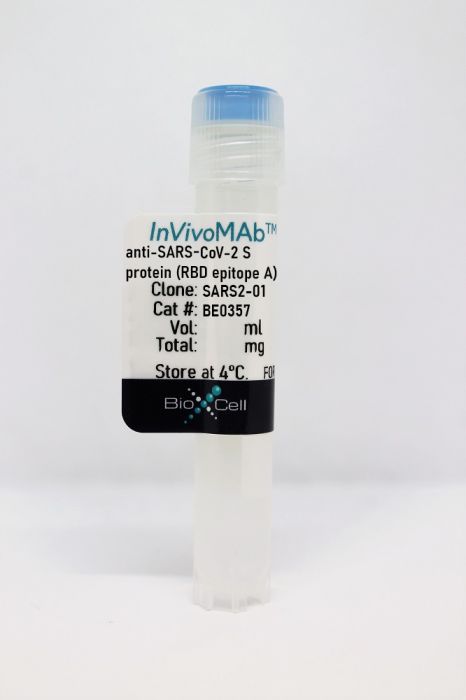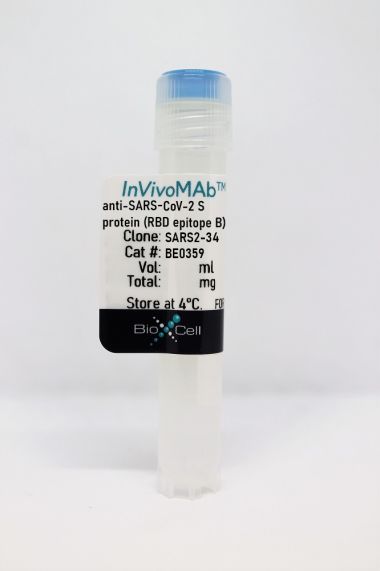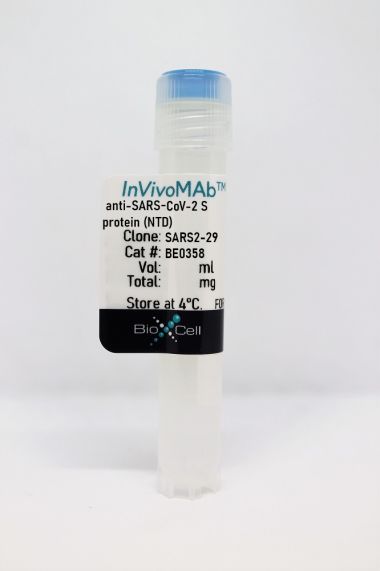InVivoMAb anti-SARS-CoV-2 S protein (RBD epitope A)
Product Details
The SARS2-01 monoclonal antibody reacts with the receptor binding domain (RBD) in the spike (S) protein of SARS-CoV-2 (Severe Acute Respiratory Syndrome Coronavirus 2). SARS-CoV-2 is a positive-sense, single-stranded RNA virus which causes the acute respiratory disease COVID-19. The S protein is the main surface antigen of SARS-CoV-2. The RBD in the S protein specifically binds to angiotensin-converting enzyme 2 (ACE2) on target cells, mediating SARS-CoV-2 host cell entry. The SARS2-01 antibody has been shown to block the binding of the SARS-CoV-2 S protein to ACE2 in vitro.Specifications
| Isotype | Mouse IgG1, κ |
|---|---|
| Recommended Isotype Control(s) | InVivoMAb mouse IgG1 isotype control, unknown specificity |
| Recommended Dilution Buffer | InVivoPure pH 7.0 Dilution Buffer |
| Conjugation | This product is unconjugated. Conjugation is available via our Antibody Conjugation Services. |
| Immunogen | SARS-CoV-2 S and RBD proteins |
| Reported Applications |
in vitro blocking of SARS-CoV-2 S protein Flow cytometry ELISA |
| Formulation |
PBS, pH 7.0 Contains no stabilizers or preservatives |
| Endotoxin |
<2EU/mg (<0.002EU/μg) Determined by LAL gel clotting assay |
| Purity |
>95% Determined by SDS-PAGE |
| Sterility | 0.2 µm filtration |
| Production | Purified from cell culture supernatant in an animal-free facility |
| Purification | Protein G |
| RRID | AB_2894776 |
| Molecular Weight | 150 kDa |
| Storage | The antibody solution should be stored at the stock concentration at 4°C. Do not freeze. |
Recommended Products
in vitro blocking of SARS-CoV-2 S protein
VanBlargan, L., et al. (2021). "A potently neutralizing anti-SARS-CoV-2 antibody inhibits variants of concern by binding a highly conserved epitope" bioRxiv . PubMed
With the emergence of SARS-CoV-2 variants with increased transmissibility and potential resistance, antibodies and vaccines with broadly inhibitory activity are needed. Here we developed a panel of neutralizing anti-SARS-CoV-2 mAbs that bind the receptor binding domain of the spike protein at distinct epitopes and block virus attachment to cells and its receptor, human angiotensin converting enzyme-2 (hACE2). While several potently neutralizing mAbs protected K18-hACE2 transgenic mice against infection caused by historical SARS-CoV-2 strains, others induced escape variants in vivo and lost activity against emerging strains. We identified one mAb, SARS2-38, that potently neutralizes all SARS-CoV-2 variants of concern tested and protects mice against challenge by multiple SARS-CoV-2 strains. Structural analysis showed that SARS2-38 engages a conserved epitope proximal to the receptor binding motif. Thus, treatment with or induction of inhibitory antibodies that bind conserved spike epitopes may limit the loss of potency of therapies or vaccines against emerging SARS-CoV-2 variants.
in vitro blocking of SARS-CoV-2 S protein
Liu, Z., et al. (2021). "Identification of SARS-CoV-2 spike mutations that attenuate monoclonal and serum antibody neutralization" Cell Host Microbe 29(3): 477-488 e474. PubMed
Neutralizing antibodies against the SARS-CoV-2 spike (S) protein are a goal of COVID-19 vaccines and have received emergency use authorization as therapeutics. However, viral escape mutants could compromise efficacy. To define immune-selected mutations in the S protein, we exposed a VSV-eGFP-SARS-CoV-2-S chimeric virus, in which the VSV glycoprotein is replaced with the S protein, to 19 neutralizing monoclonal antibodies (mAbs) against the receptor-binding domain (RBD) and generated 50 different escape mutants. Each mAb had a unique resistance profile, although many shared residues within an epitope of the RBD. Some variants (e.g., S477N) were resistant to neutralization by multiple mAbs, whereas others (e.g., E484K) escaped neutralization by convalescent sera. Additionally, sequential selection identified mutants that escape neutralization by antibody cocktails. Comparing these antibody-mediated mutations with sequence variation in circulating SARS-CoV-2 revealed substitutions that may attenuate neutralizing immune responses in some humans and thus warrant further investigation.
in vitro blocking of SARS-CoV-2 S protein, Flow Cytometry
Hassan, A. O., et al. (2020). "A Single-Dose Intranasal ChAd Vaccine Protects Upper and Lower Respiratory Tracts against SARS-CoV-2" Cell 183(1): 169-184 e113. PubMed
The coronavirus disease 2019 pandemic has made deployment of an effective vaccine a global health priority. We evaluated the protective activity of a chimpanzee adenovirus-vectored vaccine encoding a prefusion stabilized spike protein (ChAd-SARS-CoV-2-S) in challenge studies with severe acute respiratory syndrome coronavirus 2 (SARS-CoV-2) and mice expressing the human angiotensin-converting enzyme 2 receptor. Intramuscular dosing of ChAd-SARS-CoV-2-S induces robust systemic humoral and cell-mediated immune responses and protects against lung infection, inflammation, and pathology but does not confer sterilizing immunity, as evidenced by detection of viral RNA and induction of anti-nucleoprotein antibodies after SARS-CoV-2 challenge. In contrast, a single intranasal dose of ChAd-SARS-CoV-2-S induces high levels of neutralizing antibodies, promotes systemic and mucosal immunoglobulin A (IgA) and T cell responses, and almost entirely prevents SARS-CoV-2 infection in both the upper and lower respiratory tracts. Intranasal administration of ChAd-SARS-CoV-2-S is a candidate for preventing SARS-CoV-2 infection and transmission and curtailing pandemic spread.
- SARS-CoV-2,
- Genetics,
- Immunology and Microbiology
Pre-existing immunity modulates responses to mRNA boosters.
In Cell Reports on 28 March 2023 by Dangi, T., Sanchez, S., et al.
PubMed
mRNA vaccines are effective in preventing severe COVID-19, but breakthrough infections, emerging variants, and waning immunity warrant the use of boosters. Although mRNA boosters are being implemented, the extent to which pre-existing immunity influences the efficacy of boosters remains unclear. In a cohort of individuals primed with the mRNA-1273 or BNT162b2 vaccines, we report that lower antibody levels before boost are associated with higher fold-increase in antibody levels after boost, suggesting that pre-existing antibody modulates the immunogenicity of mRNA vaccines. Our studies in mice show that pre-existing antibodies accelerate the clearance of vaccine antigen via Fc-dependent mechanisms, limiting the amount of antigen available to prime B cell responses after mRNA boosters. These data demonstrate a "tug of war" between pre-existing antibody responses and de novo B cell responses following mRNA vaccination, and they suggest that transient downmodulation of antibody effector function may improve the efficacy of mRNA boosters. Copyright © 2023 The Author(s). Published by Elsevier Inc. All rights reserved.





